The Ballon d’Or has long been considered the most prestigious individual award in football. Every year, it celebrates the player who has truly shone above the rest. Throughout its rich history — starting back in 1956 — this coveted trophy has often gone to legends like Johan Cruyff, George Best, and of course modern-day superstars like Cristiano Ronaldo and Lionel Messi.
Yet, some players made their mark even earlier than most. Winning the Ballon d’Or is an incredible feat at any age — but lifting the trophy before turning 25? That’s truly special. Here we look at 10 of the youngest Ballon d’Or winners who took the world by storm.
1. Ronaldo Nazário — 21 years, 3 months, 5 days (1997)
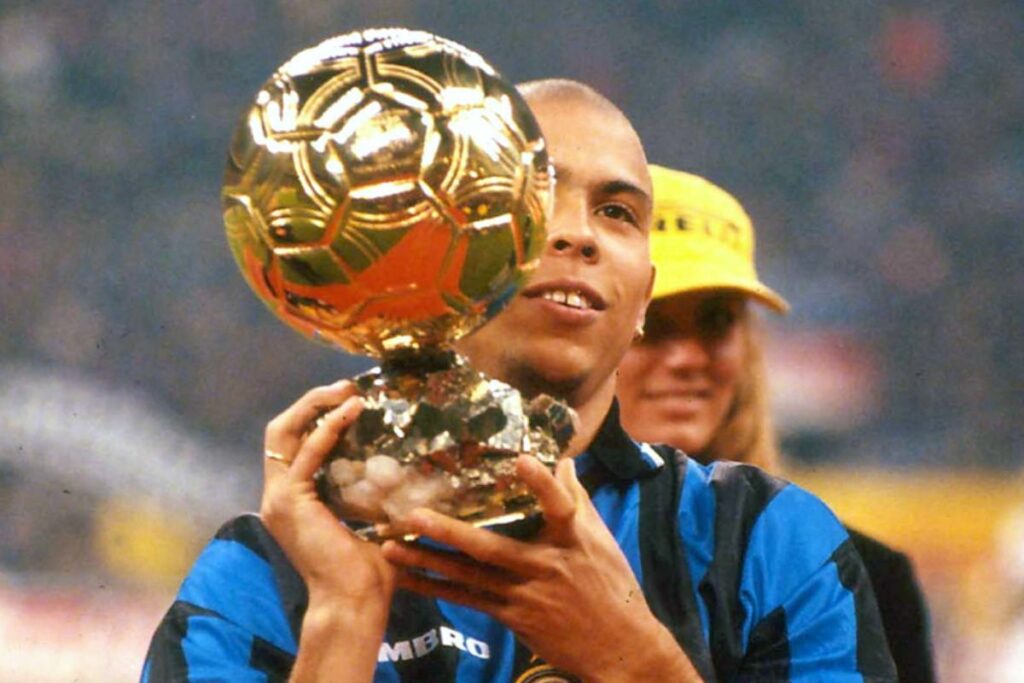
The Brazilian phenomenon, Ronaldo Nazário — also known simply as R9 — shattered expectations as a teenager. By 21, he had conquered Europe with his blistering pace, supernatural skill, and lethal finishing. The world had never seen a striker like him. In 1997, after a spectacular season with both Barcelona and Inter Milan — including an unforgettable Copa del Rey triumph — Ronaldo was crowned the Ballon d’Or winner. Injuries would plague him later in his career, but at that age, Ronaldo was an unstoppable force who forever changed the role of a center-forward.
Ronaldo Nazário Career Stats
| Years | Team | Appearances (Goals) |
|---|---|---|
| 1993–1994 | Cruzeiro | 34 (34) |
| 1994–1996 | PSV | 46 (42) |
| 1996–1997 | Barcelona | 37 (34) |
| 1997–2002 | Inter Milan | 68 (49) |
| 2002–2007 | Real Madrid | 127 (83) |
| 2007–2008 | AC Milan | 20 (9) |
| 2009–2011 | Corinthians | 52 (29) |
| Total | — | 384 (280) |
2. Michael Owen — 22 years, 4 days (2001)
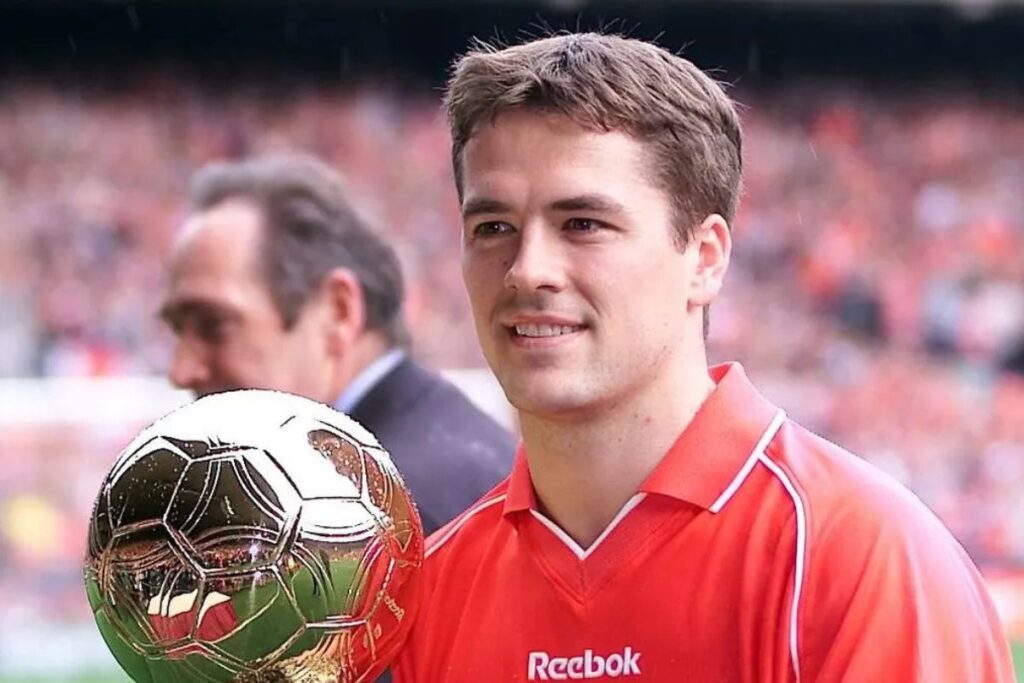
Michael Owen was one of England’s most exciting young forwards. By 2001, he had already scored iconic goals — none more famous than his slalom run against Argentina at the 1998 World Cup. That year, Owen was instrumental in Liverpool’s treble of FA Cup, League Cup, and UEFA Cup. Known for his electric pace and sharp finishing, Owen was the first English player in decades to win the Ballon d’Or. Even though injuries curtailed his peak years, that night in 2001 is forever etched in football history.
Michael Owen Career Stats
| Years | Team | Appearances (Goals) |
|---|---|---|
| 1996–2004 | Liverpool | 216 (118) |
| 2004–2005 | Real Madrid | 36 (13) |
| 2005–2009 | Newcastle United | 71 (26) |
| 2009–2012 | Manchester United | 31 (5) |
| 2012–2013 | Stoke City | 8 (1) |
| Total | — | 362 (175) |
3. Lionel Messi — 22 years, 5 months, 7 days (2009)
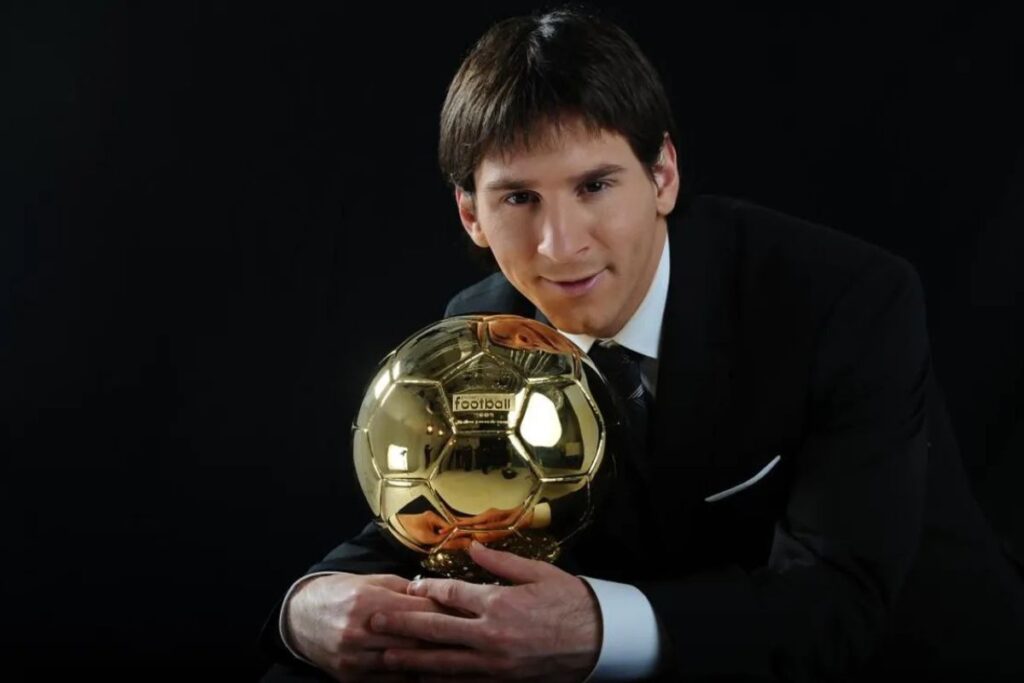
Few players have redefined the sport like Lionel Messi. By the time he won his first Ballon d’Or in 2009 at just 22, Messi had already helped Barcelona to an unprecedented treble under Pep Guardiola. His mesmerizing dribbling, incredible balance, and eye for goal were already becoming legendary. Little did the world know, this was just the first of eight Ballon d’Ors for the Argentine maestro — a record that may never be broken.
Lionel Messi Career Stats
| Years | Team | Appearances (Goals) |
|---|---|---|
| 2003–2004 | Barcelona C | 10 (5) |
| 2004–2005 | Barcelona B | 22 (6) |
| 2004–2021 | Barcelona | 520 (474) |
| 2021–2023 | Paris Saint-Germain | 58 (22) |
| 2023– | Inter Miami | 38 (31) |
4. George Best — 22 years, 7 months, 2 days (1968)
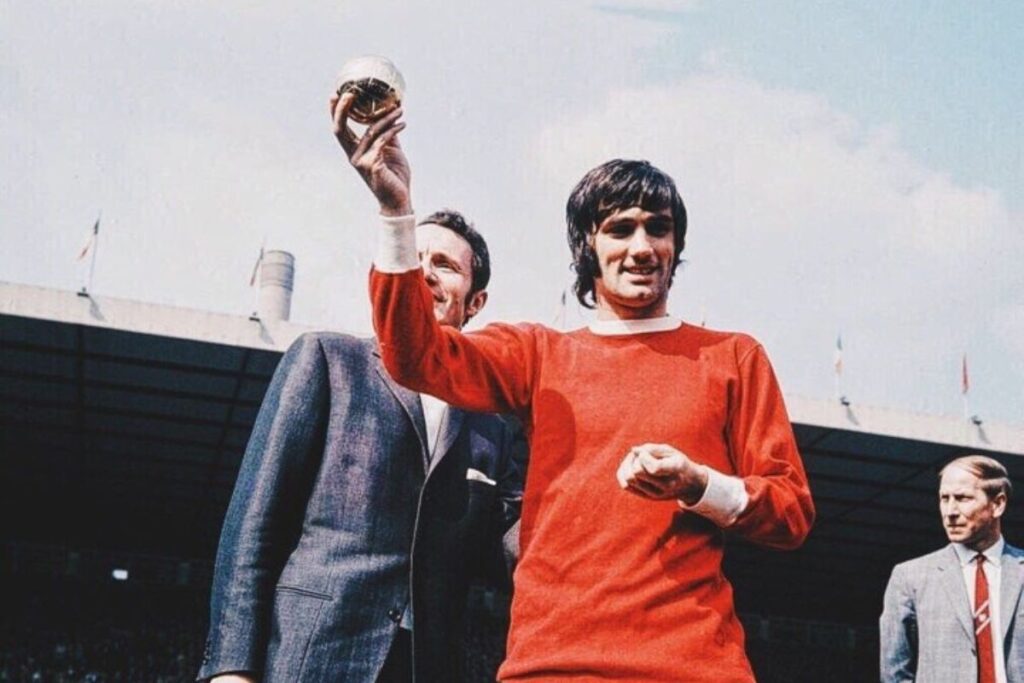
George Best played the game like an artist. The Northern Irish winger won the Ballon d’Or after leading Manchester United to their first European Cup triumph in 1968. Known for his flair, creativity, and skillful dribbling, Best was a true icon both on and off the pitch. Though his career was short-lived, his brilliance left an indelible legacy, inspiring generations of wingers that followed.
George Best Career Stats
| Years | Team | Appearances (Goals) |
|---|---|---|
| 1963–1974 | Manchester United | 361 (137) |
| 1974 | Dunstable Town | 0 (0) |
| 1975 | Stockport County | 3 (2) |
| 1975–1976 | Cork Celtic | 3 (0) |
| 1976 | Los Angeles Aztecs | 23 (15) |
| 1976–1977 | Fulham | 42 (8) |
| 1977–1978 | Los Angeles Aztecs | 32 (12) |
| 1978–1979 | Fort Lauderdale Strikers | 28 (6) |
| 1979–1980 | Hibernian | 17 (3) |
| 1980–1981 | San Jose Earthquakes | 56 (21) |
| 1982–1983 | AFC Bournemouth | 5 (0) |
| 1983 | Brisbane Lions | 4 (0) |
| 1984 | Tobermore United | 1 (0) |
| Total | — | 616 (204) |
5. Oleg Blokhin — 23 years, 1 month, 25 days (1975)
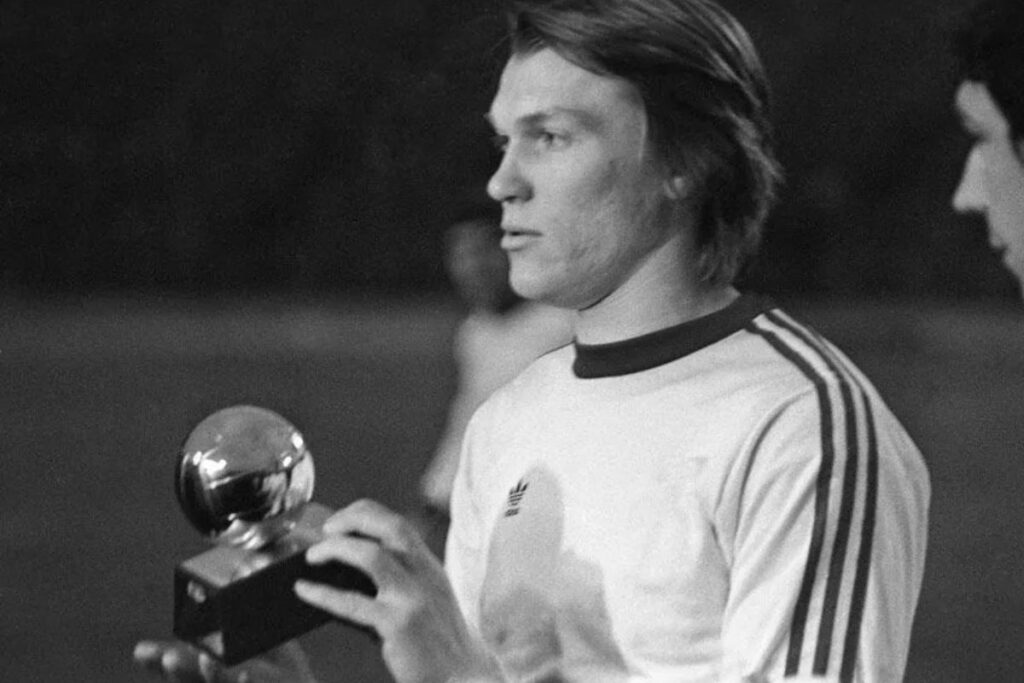
Before the modern global game, the Soviet Union produced some incredible players — and Oleg Blokhin was their shining star. Playing for Dynamo Kyiv under legendary coach Valeriy Lobanovskyi, Blokhin combined speed and tactical intelligence to help his club conquer Europe. In 1975, after winning the Cup Winners’ Cup and Super Cup, he was deservedly named Europe’s best player.
Oleg Blokhin Career Stats
| Years | Team | Appearances (Goals) |
|---|---|---|
| 1969–1988 | Dynamo Kyiv | 432 (211) |
| 1988–1989 | Vorwärts Steyr | 41 (9) |
| 1989–1990 | Aris Limassol | 22 (5) |
| Total | — | 495 (225) |
6. Cristiano Ronaldo — 23 years, 9 months, 27 days (2008)
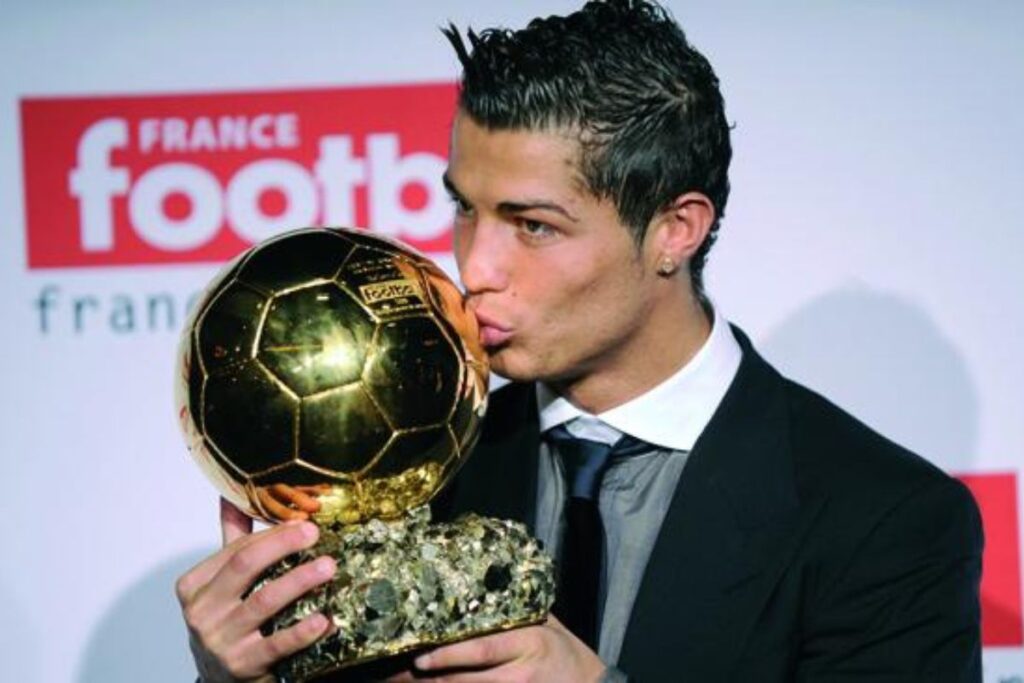
Cristiano Ronaldo is synonymous with relentless hard work and spectacular skill. In 2008, he scored 42 goals for Manchester United as they won the Premier League and the UEFA Champions League. His Ballon d’Or win was the first of five — an honor that started him on the path to becoming one of the greatest players of all time. Ronaldo at 23 was already a goalscoring machine with a competitive drive like no other.
Cristiano Ronaldo Career Stats
| Years | Team | Appearances (Goals) |
|---|---|---|
| 2002–2003 | Sporting CP B | 2 (0) |
| 2002–2003 | Sporting CP | 25 (3) |
| 2003–2009 | Manchester United | 196 (84) |
| 2009–2018 | Real Madrid | 292 (311) |
| 2018–2021 | Juventus | 98 (81) |
| 2021–2022 | Manchester United | 40 (19) |
| 2023– | Al-Nassr | 77 (74) |
7. Eusébio — 23 years, 11 months, 3 days (1965)
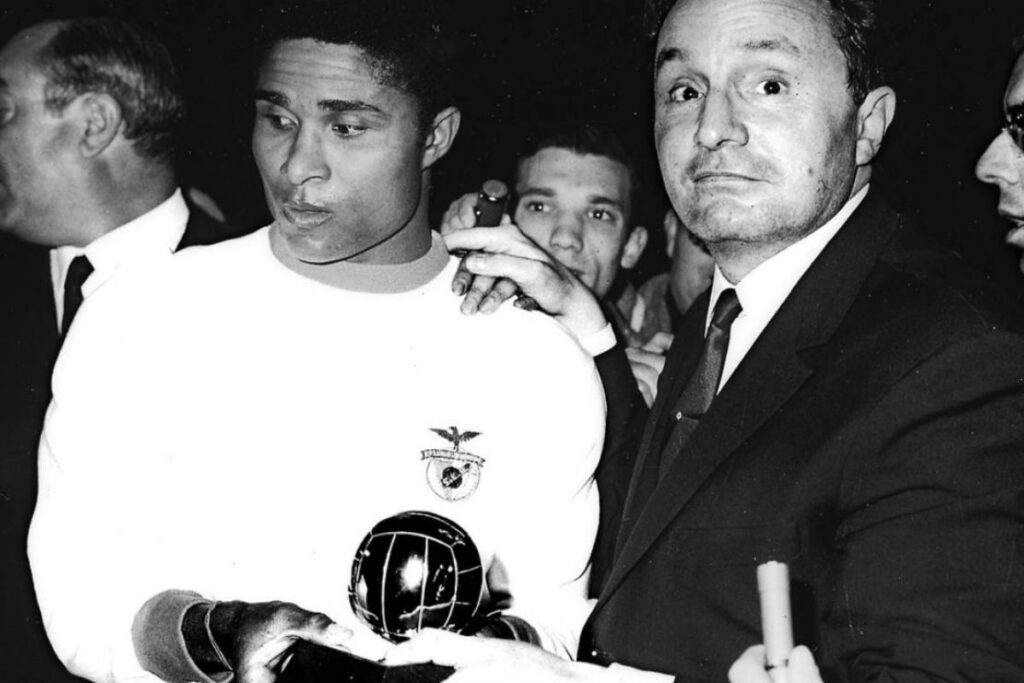
The “Black Panther” Eusébio was a pioneer. Born in Mozambique and starring for Portugal, he dazzled with Benfica. Eusébio led his club to countless titles and European Cup finals — and in 1965 became the first player born in Africa to win the Ballon d’Or. Known for his thunderous shot and prolific goalscoring, Eusébio paved the way for future superstars from outside Europe.
Eusébio Career Stats
| Years | Team | Appearances (Goals) |
|---|---|---|
| 1957–1960 | Sporting Lourenço Marques | 42 (77) |
| 1961–1975 | Benfica | 301 (317) |
| 1975 | Boston Minutemen | 7 (2) |
| 1975 | Monterrey | 10 (1) |
| 1975–1976 | Toronto Metros-Croatia | 21 (16) |
| 1976 | Beira-Mar | 12 (3) |
| 1976–1977 | Las Vegas Quicksilvers | 17 (2) |
| 1977–1978 | União de Tomar | 12 (3) |
| 1978–1979 | New Jersey Americans | 9 (2) |
| 1979–1980 | Buffalo Stallions (indoor) | 5 (1) |
| Total | — | 436 (424) |
8. Johan Cruyff — 24 years, 8 months, 3 days (1971)
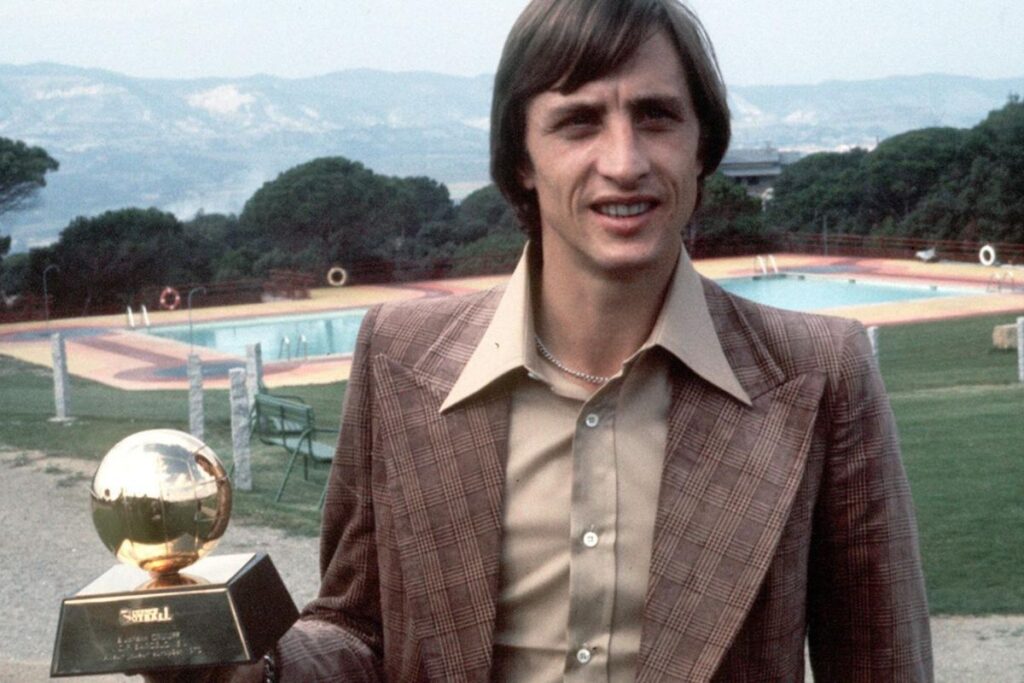
Johan Cruyff was not just a player — he was a visionary. The Dutchman was central to Ajax’s domination of Europe in the early 1970s. He embodied the “Total Football” philosophy that changed the sport forever. Winning his first Ballon d’Or at 24 was just the beginning; Cruyff would go on to collect two more and remain one of the most iconic figures in football history.
Johan Cruyff Career Stats
| Years | Team | Appearances (Goals) |
|---|---|---|
| 1964–1973 | Ajax | 245 (193) |
| 1973–1978 | Barcelona | 143 (48) |
| 1979 | Los Angeles Aztecs | 22 (14) |
| 1980–1981 | Washington Diplomats | 29 (12) |
| 1981 | → Levante (loan) | 10 (2) |
| 1981–1983 | Ajax | 36 (14) |
| 1983–1984 | Feyenoord | 33 (11) |
| Total | — | 518 (294) |
9. Marco van Basten — 24 years, 1 month, 27 days (1988)
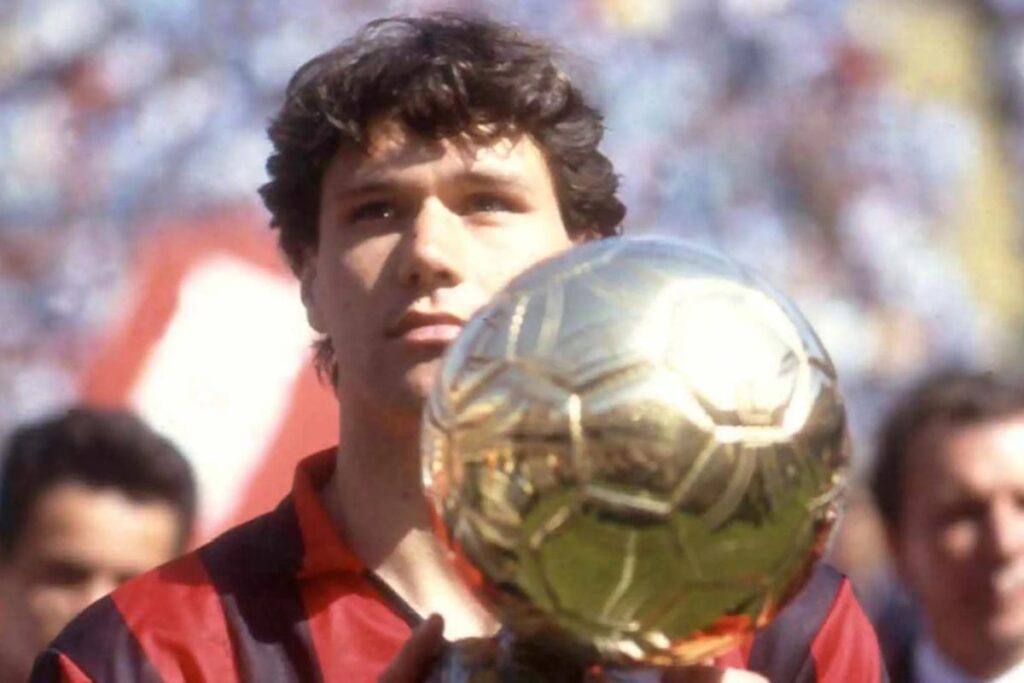
There are goals — and then there are Van Basten goals. The Dutch striker produced one of football’s most iconic moments with his impossible volley at Euro 1988. Combining elegance with clinical finishing, Van Basten conquered Europe with AC Milan and the Netherlands. That first Ballon d’Or win recognized him as one of the most technically perfect strikers the sport has ever seen.
Marco van Basten Career Stats
| Years | Team | Appearances (Goals) |
|---|---|---|
| 1981–1987 | Ajax | 133 (127) |
| 1987–1995 | Milan | 147 (91) |
| Total | — | 280 (218) |
10. Alfredo Di Stéfano — 25 years, 6 months, 17 days (1957)
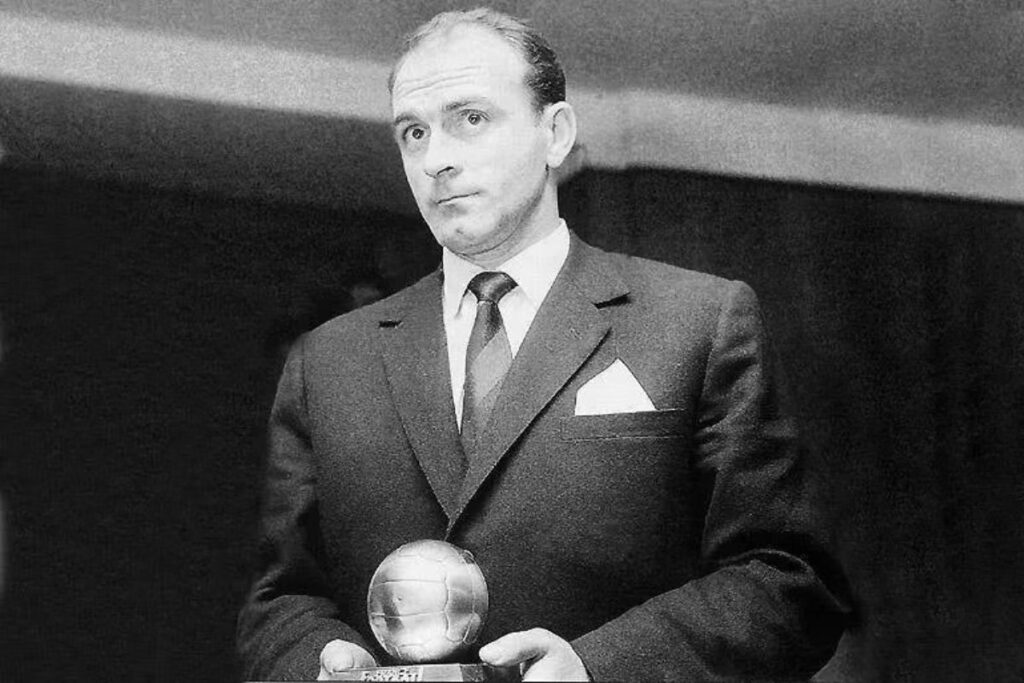
Alfredo Di Stéfano was a trailblazer at Real Madrid. Versatile and tireless, he was capable of playing in virtually every position — a visionary before his time. By 25, Di Stéfano had already led Madrid to European dominance, and his Ballon d’Or win capped one of football’s most complete skill sets. The Argentine-born legend set new standards for future generations.
Each of these players took the football world by storm at a young age, becoming the very best before most had hit their prime. The Ballon d’Or gave them the recognition they deserved — and their brilliance still resonates today. Who will be next to join this elite list of precocious superstars? Only time will tell. One thing is certain: the Ballon d’Or will continue to honor those who dare to redefine what’s possible on the pitch.
Alfredo Di Stéfano Career Stats
| Years | Team | Appearances (Goals) |
|---|---|---|
| 1945–1949 | River Plate | 66 (49) |
| 1945–1946 | → Huracán (loan) | 25 (10) |
| 1949–1953 | Millonarios | 101 (90) |
| 1953–1964 | Real Madrid | 282 (216) |
| 1964–1966 | Espanyol | 47 (11) |
| Total | — | 521 (376) |
These ten football legends defied age to claim the Ballon d’Or early in their careers, showcasing extraordinary talent and determination. Their early triumphs not only defined their legacies but also inspired future generations. As the game evolves, new young stars will rise—but these icons set the standard for greatness.

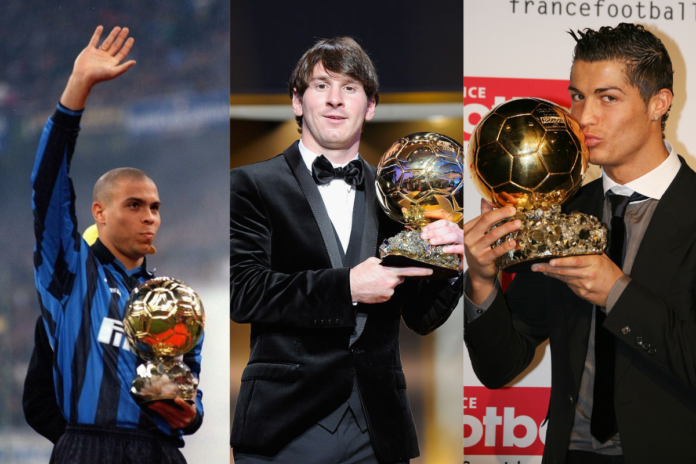
Messi is the Goat